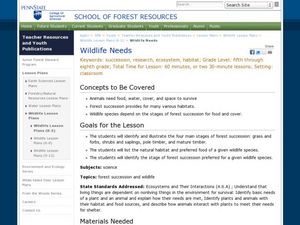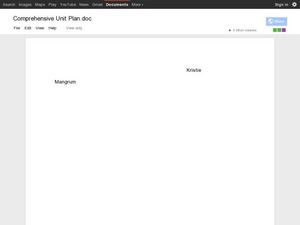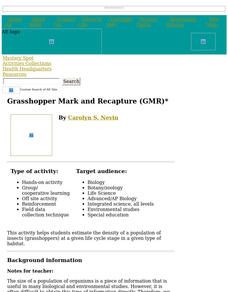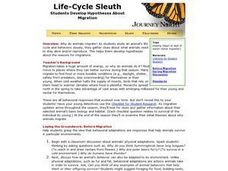Curated OER
Back to Basics
Students examine the unique and diverse historical artifacts that people have designed to fulfill their everyday needs in extraordinary ways. They identify ways humans have used design throughout history to enhance the ways they meet...
Curated OER
Citizens For the New Zoo
Third graders complete Internet research to find information about an animal and its basic needs. They design a model of a zoo habitat that would accommodate their animal. They write a letter of recommendation to a Zoo board of directors...
Curated OER
Learning About Animal Shelters for Earth Day
Students explore habitats. in this ecology and animal habitat lesson, students listen to the book A House is a House for Me by Mary Ann Hoberman. Students discuss the basic needs of animals and go on a nature walk to observe animal...
Curated OER
Wildlife Needs
Students identify the wildlife needs in a specific setting. In this wildlife needs lesson, students identify and illustrate the four stages of forest succession. Students list the natural habitat and food for a given species. Students...
Curated OER
Animal Habitats
Students research an animal and their habitat. In this animal habitat lesson, students observe a WebQuest that describes the different habitats: deserts, tundra, rainforest, forest, and ocean. They determine which habitat their animal...
Curated OER
Living On Earth
Students discover the many different animals within various habitats and discover how each individual species interacts with its particular environment. Through charting different animals and their distinct habitat and matching animals...
Curated OER
Internet Scavenger Hunt
Learners use a computer and the internet to click on highlighted words to find certain answers. They then write the answer to the questions on paper. Finally, students choose one animal to write about. They research the animal on the...
Curated OER
What's That Habitat?
Fourth graders explore the environment by researching animal characteristics. In this habitat identification lesson, 4th graders utilize paper and crayons to illustrate their own habitats or homes and discuss what it contains that is...
Curated OER
Using Comics to teach Habitat and the Balance of Nature
Students visit a specific online comics website to view a comic. They discuss the elements of the food chain that were seen in the story. They choose an inhabitant of the pond habitat that they have been reading about and do a research...
Curated OER
The Life Cycle of the Mealworm
Fourth graders provide a habitat for live mealworms and observe their life cycle. In this animal life cycle and scientific inquiry activity, 4th graders create a habitat for a live mealworm and observe and record related data as it...
Curated OER
Mangrove Ecosystem
Eager ecologists explore ecosystems through video and photographs of a Mangrove. They discuss the animals in this habitat and how they interact with each other after reading and discussing "The Sea, the Storm and the Mangrove Tangle."...
Curated OER
Wetland Habitats
Eighth graders explore the program Alice and the Internet to research wetland habitats. In this habitat lesson plan students build their own Alice world that includes wetland habitats, food sources and ways to protect the...
Curated OER
Animal Habitats
Students explore animal lifestyles by researching their characteristics. For this animal habitat lesson, students read the story Over in the Jungle and analyze the animal illustrations in the book. Students create clay animal characters...
Pennsylvania Department of Education
Animal Classes and Their Ecosystems
Students explore animal characteristics by participating in an environment identification activity. In this animal habitat lesson plan, students discuss a range of different wild life and the ecosystems that they are a part of. Students...
Curated OER
Identifying Birds
Eighth graders identify and name birds in their school yard by comparing and contrasting pictures of 12 common birds in the Phoenix metro area using the Ecology Explorers Protocol. They formulate questions based on observations that lead...
Curated OER
Native Plant Restoration Project
Pupils distinguish between exotic and native plant species. They work in groups in the field to restore a natural habitat. A class map is created to reflect their work in the field.
Curated OER
Marine & Aquatic Habitats Activities - Aquatic Animals
Young scholars explore importance of marine or aquatic habitats, and investigate habitat characteristics and conditions required by various organisms to ensure survival. They then select an animal to study and design an artificial...
Curated OER
Grasshopper Mark and Recapture (GMR)
Students estimate the density of a population of insects (grasshoppers) at a given life cycle stage in a given type of habitat.
Alabama Learning Exchange
Flutter By, Butterfly!
Students examine the basic characteristics of butterflies. They view a butterfly PowerPoint presentation, complete various labelling activity sheets, explore websites, and design a poster that includes facts and illustrations to be used...
Curated OER
Asexual versus Sexual Reproduction
Learners explore reproduction. They research organisms and groups of organisms to determine whether they reproduce sexually or asexually. In addition, they determine the organism's habitat.
Curated OER
Life-Cycle Sleuth
Students analyze an animal's life cycle and behaviors, and examine what animals need to stay alive and reproduce. They develop theories and hypotheses about the reasons for migrations, using the Journey North online project.
Curated OER
Habits: An Introduction
Second graders identify different types of habitats animals live in to have a better understanding of the world around them. They choose a habitat, draw a picture of an animal that lives there and list the unique attributes the habitat...
Curated OER
Feathers for Lunch Lesson Plan
Students discover different types of birds and the habitats in which the dwell. In this bird lesson, students read Feathers for Lunch, discuss bird facts, and build a bird habitat.
Curated OER
What does 'Endangered' mean?
Students discuss a variety of teacher led discussion questions about what makes an animal endangered. They take a short field trip to an open area and set a boundary for each child for them to either write or draw about how the location...























